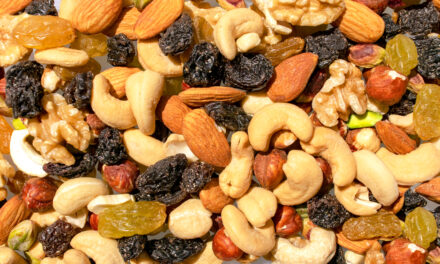Try This One-Day Water Fast for the Fall Equinox Full Moon

The concept of fasting on powerful days in nature is not a new idea, in fact for thousands of years, people have fasted on full moons, changes of season and other auspicious days to commemorate special occasions.
Full moons are also great symbolic opportunities to make changes, to release old habits and to transition to a new lifestyle and take action towards a new and healthier, happier you.
The first day of fall, fall equinox is a popular time to ritualize a change and made especially powerful with a full moon. In ancient Hindu tradition, full-moon fasting is seen as a way to purify the mind and body. Just as the full moon creates tides on oceans and lakes, it’s also thought to have a drawing effect on the toxins and emotions that interfere with our health. Full moons, then, are the perfect fasting amplifiers.
(We’ll be the first to admit there aren’t any actual-factual studies on this…but traditions happen for a reason.) Full moons aside, the fall Equinox is also often celebrated with a fall harvest feast, an important time of the year in many cultures. And it’s common to prepare for a feast with – you guessed it – a good ol’ fashioned fast.
So whatever your reason for fasting is, join us in a healthier celebration this Fall!
How to do a Full-Moon Fast
The basic version of this fast is a 24-hour dinner to dinner fast that starts the day before the full moon. You’ll get the benefits of a longer fast, but you still get to indulge in all the celebratory trappings.
Here’s how it goes:
- No snacks/calories after 6:00 pm on Day 0
You should drink plenty of water. And if you’re feeling a sweet tooth coming along, go for a zero-calorie naturally sweetened Zevia. (Seriously satisfying.)
- Get to bed early
As we’ve mentioned in our article about preparing for a fast, sleep is one of the most important factors if you want to fly through a fast. So plan on getting an hour more sleep than you normally would.
Also, consider journaling or doing a deep-breathing session to destress – it’s proven to help you sleep.
- Wake up with a positive intention and a goal
Tapping into the Hindu full-moon fasting tradition, try waking up with a positive intention through prayer or meditation. (You can also pick an empowering mantra to repeat throughout the day.) Then draft up work or personal goal that will keep you occupied and engaged throughout the day.
The more positive vibes for your fasting the day, the better your fast will be! And fasters commonly report that fasts seem quicker when their focused and productive.
- Choose your fasting beverage
Not only is hydration especially important when you’re fasting, but certain drinks such as coffee and tea can actually stimulate autophagy and help you burn more fat.
We recommend the Pique matcha green fasting tea, which is super high in appetite-suppressing and energy-promoting catechins. But any kind of coffee or herbal tea will do.
Just skip the milk and sugar!
- Movement
Whether it’s in the morning or after you get off work, make sure to take advantage of the manifold benefits of fasted exercise. It increases autophagy, boosts fat-burning, and, contrary to popular belief, it won’t make your body eat its own muscles.
Walking, running, and a normal form of exercise is recommended. Just don’t overdo it! Although many people experience improved performance during a fast, you should avoid high-intensity exercises and reps to exhaustion.
- Supplement with essential amino acids (EAAs)
This step definitely isn’t a requirement, but EAAs can boost your energy while preventing any potential muscle breakdown that could occur before you’re fully in ketosis.
EAAs are preferable to BCAAs because the latter isn’t absorbed as well and can actually convert into glucose, which can throw off your fast. Try a no-calorie version that mixes in water and tastes delicious.
- Break your fast at 6:00 pm on Day 1
We know it’s tempting to break your fast with the bite-sized treat that you stole from your kids’ recent play date candy bag. (It’s a free country…) But while we do encourage having fun and indulging in your favorite treats, try breaking your fast with bone broth or a small soup at least thirty minutes before. This will give your gut time to prepare for food that’s harder to digest.
Now, for anyone who’s okay with skipping on the initial 24 hour fast entirely, you can extend your fast further–here are two more stopping points to consider.
- 6:00 am on Day 2 – 36 hours
This will result in a 36-hour fast, and it only involves skipping one more dinner. (Just make sure you’ve had enough salt throughout the day and that you’re adequately hydrated before bed!) It’s a good thing to try if you’re interested in alternate-day fasting.
- 6:00 am on Day 3 – 72 hours
We’ll go ahead and call this one the ‘post pandemic stress especiales’, because the longer you fast, the more stress your body can handle. (That’s why fasting is so highly recommended for many types of chemotherapy treatment.)
You should always consult a doctor before starting a fasting journey. But this is especially true when you do a prolonged fast, which is two days or more. Fasting might not seem to jibe with days of celebration at first glance. But if you plan it right with a dinner to dinner fast, you can have your a special holiday and care for your body too! Just make sure you double-check with your health care provider first. And if you feel like doing even more for your body, hold out till you reach the 36 or even 72-hour mark!





